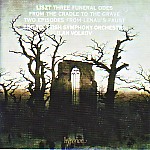Nobody did death like Liszt. Say what you will, he was the master of musical gloom. Perhaps one reason that he enjoyed death so much was because he was such a devout Catholic, which means he really was looking forward to life in the Great Beyond. So don’t let the forbidding cover art or dreary titles dissuade you. Some of Liszt’s best orchestral music is here. From the Cradle to the Grave sounds amazingly like proto-Sibelius, and its simplicity of form and memorable material makes it very satisfying.
The second of the Two Episodes is of course very well known–it’s the First Mephisto Waltz. This performance is a touch stiff, but the use of the optional second ending, with its quiet close, complements the rest of the program. The real masterpiece, though, is The Nocturnal Procession, a truly atmospheric realization of poetic moods. The Three Funeral Odes are the darkest works. Two were written in memory of Liszt’s children, Daniel and Blandine. Doubtless the composer was sincere, though one can’t help but think that he treated them with more love and consideration in death than he did in life (he was a dreadful parent).
The last of the Odes, The Funeral Triumph of Tasso, is another fine work that should not be confused with the earlier symphonic poem Tasso, to which it forms a pretty hefty epilog. Aside from that rather too heavy Mephisto Waltz, the performances are suitably brooding, but never dull. Ilan Volkov maintains the necessary concentration throughout each work, the brief choral contributions in the first of the Odes (“Death”, as if you’d never have guessed) are well done, and the sound is excellent. A fine disc–just don’t play it all at once, even if you happen to be Catholic.
































